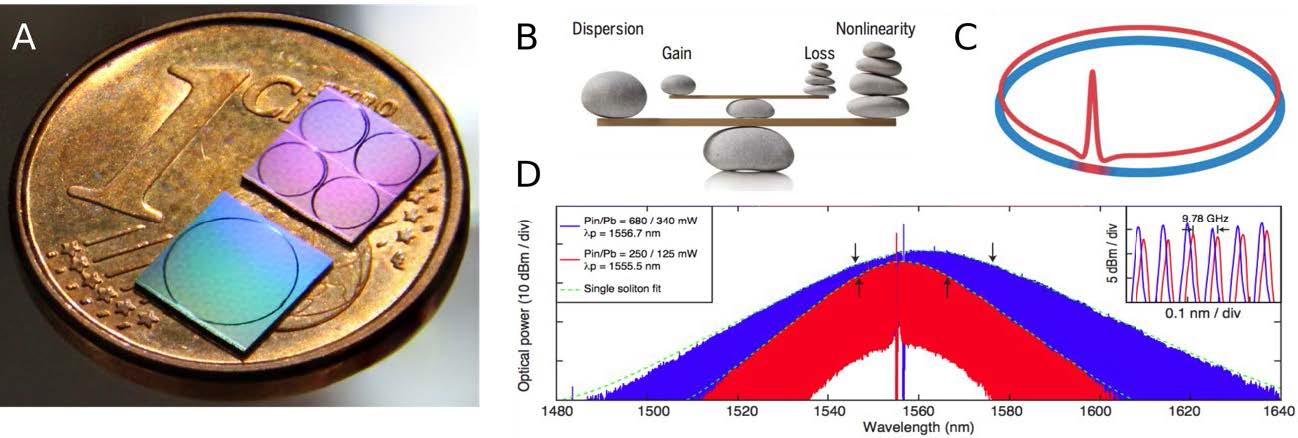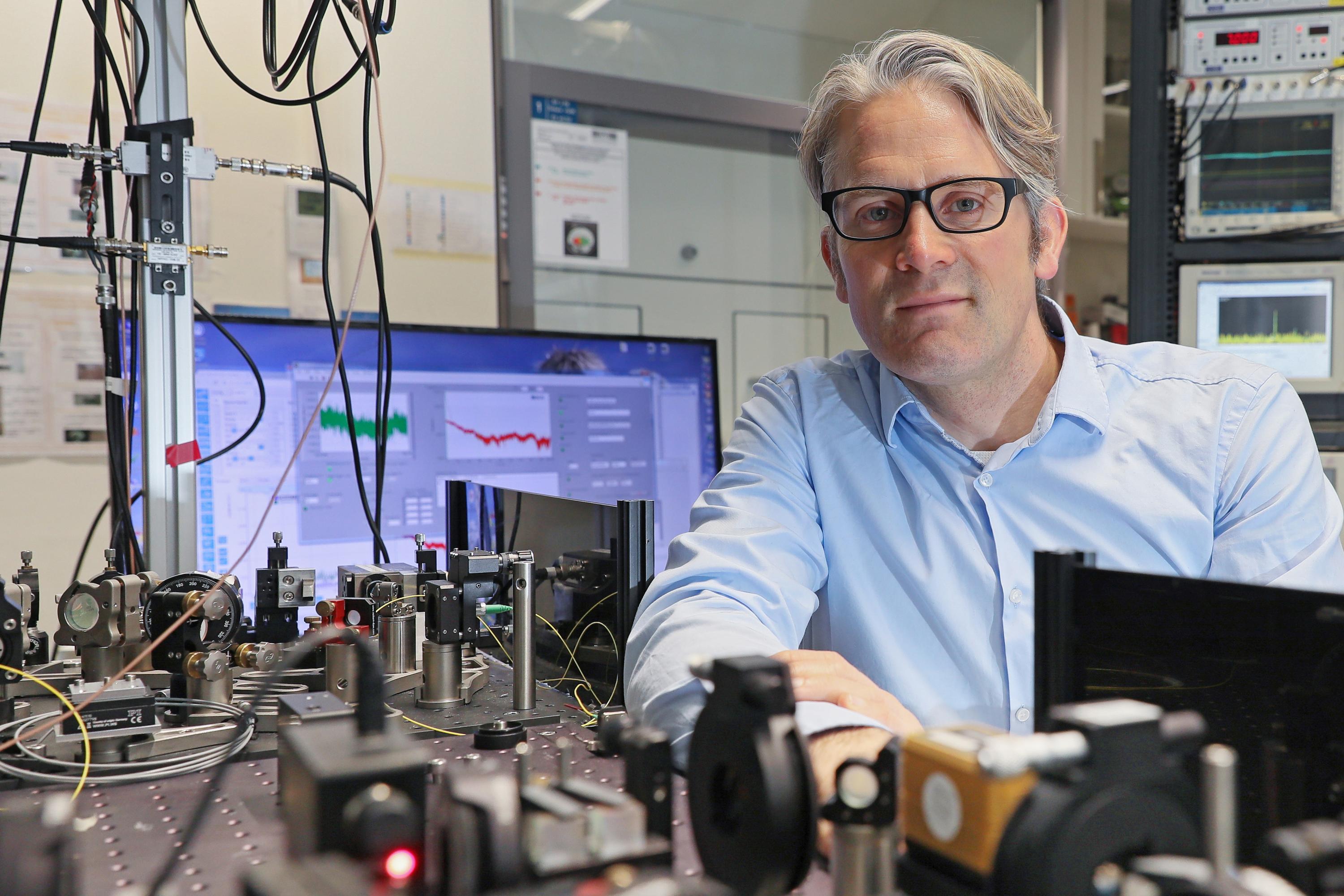6163银河线路检测中心学术论坛(第十三讲)
Photonic Chip based Frequency Combs
TOBIAS J. KIPPENBERG
Full Professor
Swiss federal Institute of Technology in Lausanne(EPFL)
Abstract:
The development of optical frequency combs, and notably self-referencing, has revolutionized precision measurements over the past decade, and enabled counting of the cycles of light. Frequency combs, have enabled dramatic advances in timekeeping, metrology and spectroscopy. In 2007, it was discovered that such combs can also be generated using an optical microresonator using parametric frequency conversion. Importantly, such Kerr combs also enable to generate dissipative temporal solitons (DKS), which are formally solutions to a driven dissipative nonlinear Schrödinger equation, termed Lugiato-Lefever equation–first derived to describe spatial self-organization phenomena. DKS have unlocked the full potential of Kerr combs enabling a deterministic route to broadband, and coherent optical frequency combs, whose bandwidth can be enhanced using soliton broadening phenomena, such as Soliton Cherenkov Radiation. Such Solitons Kerr combs on a chip have enabled to realize counting of the cycles of light, realize dual comb spectrometers on a chip, enabled dual comb based ultrafast ranging, massively parallel coherent communication, and offered a novel approach to massively parallel FCMW LiDAR. Recent advances based on the photonic damascene process enable ultra low loss nonlinear photonic circuits based on silicon nitride (Si3N4), have enabled ultra-low losses, and direct integration with on chip pump lasers. On the fundamental side, new and theoretically not previously predicted dynamics has been observed ranging from formation of soliton crystals, soliton switching, and new type of breather solitons, and emergent nonlinear dynamics in arrays of coupled resonators. Soliton Kerr frequency combs thereby are providing a highly fruitful new playground for fundamental nonlinear science and applications alike.

Figure Dissipative Kerr solitons in microresonators. (A) Photograph of Si3N4 photonic chips on 1-cent Euro coin. (B) Principle of a DKS that balances dispersion and nonlinearity, as well as parametric gain and cavity loss. (C) Temporal dissipative soliton waveform envelope in a microresonator. (D) Optical spectra of single-DKS states with 9.78 GHz repetition rates (in the X-band).
Biography:
Tobias J. Kippenberg is Full Professor in the Institute of Physics and Electrical Engineering at EPFL in Switzerland since 2013 and joined EPFL in 2008 as Tenure Track Assistant Professor. Prior to EPFL, he was Independent Max Planck Junior Research group leader at the Max Planck Institute of Quantum Optics in Garching, Germany. While at the MPQ he demonstrated radiation pressure cooling of optical micro-resonators, and developed techniques with which mechanical oscillators can be cooled, measured and manipulated in the quantum regime that are now part of the research field of Cavity Quantum Optomechanics. Moreover, his group discovered the generation of optical frequency combs using high Q micro-resonators, a principle known now as micro-combs or Kerr combs.
For his early contributions in these two research fields, he has been recipient of the EFTF Award for Young Scientists (2011), The Helmholtz Prize in Metrology (2009), the EPS Fresnel Prize (2009), ICO Award (2014), Swiss Latsis Prize (2015), as well as the Wilhelmy Klung Research Prize in Physics (2015), the 2018 ZEISS Research Award and 2020 OSA R. Wood Award. Moreover, he is 1st prize recipient of the "8th European Union Contest for Young Scientists" in 1996 and is listed in the Highly Cited Researchers List of 1% most cited Physicists in 2014-2019. He is founder of the startup LIGENTEC SA, an integrated photonics foundry.

现场参会报名方式:按照现行防疫要求,仅面向符合6163银河线路检测中心防疫要求、可以参加集体活动的6163银河线路检测中心校内师生开放现场参会报名(限额50人),请在3月17日(星期四)12:00前提交报名信息(报名链接:https://jinshuju.net/f/D3hOx8),最终报名结果将以短信和邮件通知为准。(温馨提醒:请参会师生注意戴好口罩,并遵守6163银河线路检测中心疫情常态化会议场所防控规定。)
蔻享直播链接:https://www.koushare.com/lives/room/614034
6163银河线路检测中心学术论坛创办于2020年9月,邀请国内外高校和研究机构高层次科技创新领军学者就物理学及相关领域的基础前沿探索、关键技术突破和热点问题等做学术演讲,旨在推进高质量学术交流,促进学科交叉融合和开拓新兴特色方向研究,培养具有科学精神、全球视野、创新能力、批判性思维的优秀青年人才。
6163银河线路检测中心
人工微结构和介观物理国家重点实验室
纳光电子前沿科学中心
北京物理学会
